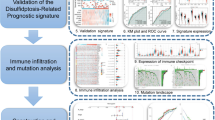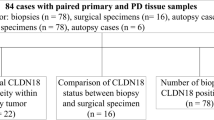Abstract
Objective
Increasing evidence has indicated that there is a correlation between Fusobacterium nucleatum (F. nucleatum) abundance and poor prognosis of colorectal cancer (CRC). Furthermore, tumor metastasis plays a decisive role in the prognosis of CRC patients. Therefore, it was hypothesized that the abundance of F. nucleatum in CRC tissues affects the tumor metastasis.
Methods
In the present study, F. nucleatum DNA obtained from 141 resected CRC samples was quantified by qPCR to determine whether there were differences in F. nucleatum abundance between groups with and without CRC metastasis.
Results
The results revealed that F. nucleatum was more abundant in CRC patients with metastasis, and CRC tissues enriched with F. nucleatum had a higher risk of lymph node metastasis and distant metastasis. The receiver operating characteristic curve indicated that F. nucleatum in CRC tissues could be used as an indicator for CRC metastasis, to some extent. Furthermore, the in vitro experiments (electron microscopy, and migration and invasion trials) revealed that F. nucleatum was a highly invasive bacterial strain, and could significantly enhance the invasion and migration capacity of SW480 and SW620 cells. In addition, a meta-analysis comprehensively indicated a slight correlation between F. nucleatum abundance and advanced CRC stage (RR=1.17, 95% CI: 1.00–1.37, P=0.04, random effect).
Conclusion
There is a correlation between F. nucleatum abundance and CRC metastasis, and F. nucleatum may serve as a metastasis biomarker for CRC patients.
Similar content being viewed by others
References
Bray F, Ferlay J, Soerjomataram I, et al. Global cancer statistics 2018: GLOBOCAN estimates of incidence and mortality worldwide for 36 cancers in 185 countries. CA Cancer J Clin, 2018,68(6):394–424
Bruckner HW, Motwani BT. Chemotherapy of advanced cancer of the colon and rectum. Semin Oncol, 1991,18(5):443–461
Siegel RL, Miller KD, Goding Sauer A, et al. Colorectal cancer statistics, 2020. CA Cancer J Clin, 2020,70(3):145–164
Song J, Park S, Oh J, et al. NUDT7 Loss Promotes Kras(G12D) CRC Development. Cancers (Basel), 2020,12(3):576
Palko-Labuz A, Maksymowicz J, Sobieszczanska B, et al. Newly Obtained Apple Pectin as an Adjunct to Irinotecan Therapy of Colorectal Cancer Reducing E. coli Adherence and beta-Glucuronidase Activity. Cancers (Basel), 2021,13(12):2952
Zhang K, Peng T, Yan Q, et al. Jiedu Sangen Decoction Inhibits Migration and Invasion of Colon Cancer SW480 Cells via Suppressing Epithelial Mesenchymal Transition. Evid Based Complement Alternat Med, 2018,2018:1495768
Tuomisto A, Norskov NP, Sirnio P, et al. Serum enterolactone concentrations are low in colon but not in rectal cancer patients. Sci Rep, 2019,9(1):11209
Fiorentini C, Carlini F, Germinario EAP, et al. Gut Microbiota and Colon Cancer: A Role for Bacterial Protein Toxins? Int J Mol Sci, 2020,21(17):6201
Aleksandrova K, Romero-Mosquera B, Hernandez V. Diet, Gut Microbiome and Epigenetics: Emerging Links with Inflammatory Bowel Diseases and Prospects for Management and Prevention. Nutrients, 2017,9(9):962
Grech G, Zhan X, Yoo BC, et al. EPMA position paper in cancer: current overview and future perspectives. EPMA J, 2015,6(1):9
Janney A, Powrie F, Mann EH. Host-microbiota maladaptation in colorectal cancer. Nature, 2020,585(7826):509–517
Zhou Z, Chen J, Yao H, et al. Fusobacterium and Colorectal Cancer. Front Oncol, 2018,8:371
Hong BY, Ideta T, Lemos BS, et al. Characterization of Mucosal Dysbiosis of Early Colonic Neoplasia. NPJ Precis Oncol, 2019,3:29
Han YW. Fusobacterium nucleatum: a commensal-turned pathogen. Curr Opin Microbiol, 2015,23:141–147
Shet UK, Oh HK, Kim HJ, et al. Quantitative analysis of periodontal pathogens present in the saliva of geriatric subjects. J Periodontal Implant Sci, 2013,43(4):183–190
Allen-Vercoe E, Jobin C. Fusobacterium and Enterobacteriaceae: important players for CRC? Immunol Lett, 2014,162(2 Pt A):54–61
Hashemi Goradel N, Heidarzadeh S, Jahangiri S, et al. Fusobacterium nucleatum and colorectal cancer: A mechanistic overview. J Cell Physiol, 2019,234(3):2337–2344
Wang S, Liu Y, Li J, et al. Fusobacterium nucleatum Acts as a Pro-carcinogenic Bacterium in Colorectal Cancer: From Association to Causality. Front Cell Dev Biol, 2021,9:710165
Slade DJ. New Roles for Fusobacterium nucleatum in Cancer: Target the Bacteria, Host, or Both? Trends Cancer, 2021,7(3):185–187
Kostic AD, Gevers D, Pedamallu CS, et al. Genomic analysis identifies association of Fusobacterium with colorectal carcinoma. Genome Res, 2012,22(2):292–298
Li YY, Ge QX, Cao J, et al. Association of Fusobacterium nucleatum infection with colorectal cancer in Chinese patients. World J Gastroenterol, 2016,22(11):3227–3233
Castellarin M, Warren RL, Freeman JD, et al. Fusobacterium nucleatum infection is prevalent in human colorectal carcinoma. Genome Res, 2012,22(2):299–306
Rubinstein MR, Wang X, Liu W, et al. Fusobacterium nucleatum promotes colorectal carcinogenesis by modulating E-cadherin/beta-catenin signaling via its FadA adhesin. Cell Host Microbe, 2013,14(2):195–206
Efrat L Amitay, Simone Werner, Marius Vital, et al. Fusobacterium and colorectal cancer: causal factor or passenger? Results from a large colorectal cancer screening study. Carcinogenesis, 2017,38(8):781–788
Feng Q, Liang S, Jia H, et al. Gut microbiome development along the colorectal adenoma-carcinoma sequence. Nat Commun, 2015,6:6528
Yu J, Feng Q, Wong SH, et al. Metagenomic analysis of faecal microbiome as a tool towards targeted non-invasive biomarkers for colorectal cancer. Gut, 2017,66(1):70–78
Wei Z, Cao S, Liu S, et al. Could gut microbiota serve as prognostic biomarker associated with colorectal cancer patients’ survival? A pilot study on relevant mechanism. Oncotarget, 2016,7(29):46158–46172
Yang Y, Weng W, Peng J, et al. Fusobacterium nucleatum Increases Proliferation of Colorectal Cancer Cells and Tumor Development in Mice by Activating Toll-Like Receptor 4 Signaling to Nuclear Factor-kappaB, and Up-regulating Expression of MicroRNA-21. Gastroenterology, 2017,152(4):851–866 e824
Chen Y, Chen Y, Zhang J, et al. Fusobacterium nucleatum Promotes Metastasis in Colorectal Cancer by Activating Autophagy Signaling via the Upregulation of CARD3 Expression. Theranostics, 2020,10(1):323–339
Zhang S, Yang Y, Weng W, et al. Fusobacterium nucleatum promotes chemoresistance to 5-fluorouracil by upregulation of BIRC3 expression in colorectal cancer. J Exp Clin Cancer Res, 2019,38(1):14
Haruki K, Kosumi K, Hamada T, et al. Association of autophagy status with amount of Fusobacterium nucleatum in colorectal cancer. J Pathol, 2020,250 (4):397–408
Mima K, Nishihara R, Qian ZR, et al. Fusobacterium nucleatum in colorectal carcinoma tissue and patient prognosis. Gut, 2016,65(12):1973–1980
Nosho K, Sukawa Y, Adachi Y, et al. Association of Fusobacterium nucleatum with immunity and molecular alterations in colorectal cancer. World J Gastroenterol, 2016,22(2):557–566
Ito M, Kanno S, Nosho K, et al. Association of Fusobacterium nucleatum with clinical and molecular features in colorectal serrated pathway. Int J Cancer, 2015,137(6):1258–1268
Yamaoka Y, Suehiro Y, Hashimoto S, et al. Fusobacterium nucleatum as a prognostic marker of colorectal cancer in a Japanese population. J Gastroenterol, 2018,53(4):517–524
Park HE, Kim JH, Cho NY, et al. Intratumoral Fusobacterium nucleatum abundance correlates with macrophage infiltration and CDKN2A methylation in microsatellite-unstable colorectal carcinoma. Virchows Arch, 2017,471(3):329–336
Kunzmann AT, Proenca MA, Jordao HW, et al. Fusobacterium nucleatum tumor DNA levels are associated with survival in colorectal cancer patients. Eur J Clin Microbiol Infect Dis, 2019,38(10):1891–1899
Eklöf V, Löfgren-Burström A, Zingmark C, et al. Cancer-associated fecal microbial markers in colorectal cancer detection. Int J Cancer, 2017,141(12):2528–2536
Liang Q, Chiu J, Chen Y, et al. Fecal Bacteria Act as Novel Biomarkers for Noninvasive Diagnosis of Colorectal Cancer. Clin Cancer Res, 2017,23(8):2061–2070
Suehiro Y, Sakai K, Nishioka M, et al. Highly sensitive stool DNA testing of Fusobacterium nucleatum as a marker for detection of colorectal tumours in a Japanese population. Ann Clin Biochem, 2017,54(1):86–91
Tunsjø HS, Gundersen G, Rangnes F, et al. Detection of Fusobacterium nucleatum in stool and colonic tissues from Norwegian colorectal cancer patients. Eur J Clin Microbiol Infect Dis, 2019,38(7):1367–1376
Wong SH, Kwong TNY, Chow TC, et al. Quantitation of faecal Fusobacterium improves faecal immunochemical test in detecting advanced colorectal neoplasia. Gut, 2017,66(8):1441–1448
Xie YH, Gao QY, Cai GX, et al. Fecal Clostridium symbiosum for Noninvasive Detection of Early and Advanced Colorectal Cancer: Test and Validation Studies. EBioMedicine, 2017,25:32–40
Chen S, Su T, Zhang Y, et al. Fusobacterium nucleatum promotes colorectal cancer metastasis by modulating KRT7-AS/KRT7. Gut Microbes, 2020,11(3):511–525
Yan X, Liu L, Li H, et al. Clinical significance of Fusobacterium nucleatum, epithelial-mesenchymal transition, and cancer stem cell markers in stage III/IV colorectal cancer patients. Onco Targets Ther, 2017,10:5031–5046
Bullman S, Pedamallu CS, Sicinska E, et al. Analysis of Fusobacterium persistence and antibiotic response in colorectal cancer. Science, 2017,358(6369):1443–1448
Xu C, Fan L, Lin Y, et al. Fusobacterium nucleatum promotes colorectal cancer metastasis through miR-1322/CCL20 axis and M2 polarization. Gut Microbes, 2021,13:1980347
Cheng K, Yan X, Zhu Y, et al. Fusobacterium nucleatum Promotes the Development of Colorectal Cancer by Activating a Cytochrome P450/Epoxyoctadecenoic Acid Axis via TLR4/Keap1/NRF2 Signaling. Cancer Res, 2021,81(17):4485–4498
Mehta RS, Nishihara R, Cao Y, et al. Association of Dietary Patterns With Risk of Colorectal Cancer Subtypes Classified by Fusobacterium nucleatum in Tumor Tissue. JAMA Oncol, 2017,3(7):921–927
Liu L, Tabung FK, Zhang X, et al. Diets That Promote Colon Inflammation Associate With Risk of Colorectal Carcinomas That Contain Fusobacterium nucleatum. Clin Gastroenterol Hepatol, 2018,16(10):1622–1631.e3
Lee DW, Han SW, Kang JK, et al. Association Between Fusobacterium nucleatum, Pathway Mutation, and Patient Prognosis in Colorectal Cancer. Ann Surg Oncol, 2018,25(11):3389–3395
Author information
Authors and Affiliations
Corresponding author
Additional information
Conflict of Interest Statement
All authors declare that they have no conflicts of interest.
This work was supported by grants from the National Natural Science Foundation of China (No. 81972005 and No. 82172339), the Natural Science Foundation of Shandong Province (No. ZR2020MH238 and No. ZR2020MH257), and the Shandong Medical and Health Technology Development Project (No. 2018WSB20002).
Electronic supplementary material
Rights and permissions
About this article
Cite this article
Chen, Wd., Zhang, X., Zhang, Yp. et al. Fusobacterium Nucleatum Is a Risk Factor for Metastatic Colorectal Cancer. CURR MED SCI 42, 538–547 (2022). https://doi.org/10.1007/s11596-022-2597-1
Received:
Accepted:
Published:
Issue Date:
DOI: https://doi.org/10.1007/s11596-022-2597-1




